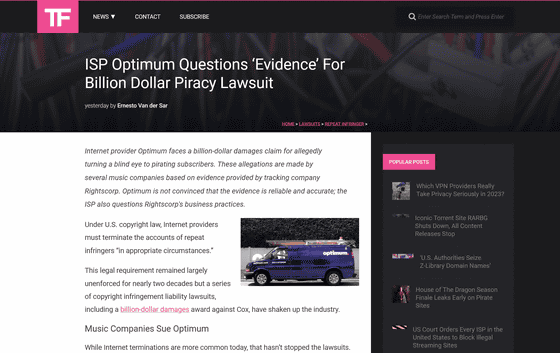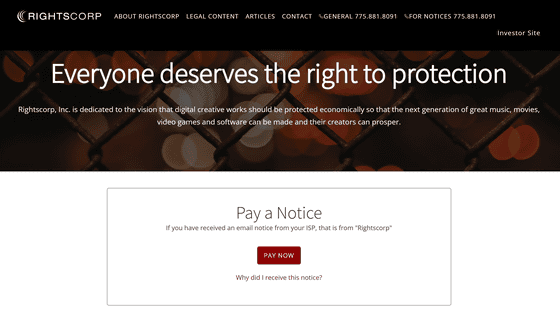Provider will be charged approximately 150 billion yen in damages for pretending not to see the pirated version

It has been reported that one of the largest internet providers in the United States has received a claim for damages of more than $1 billion (approximately 150 billion yen) for ``pretending not to see pirated subscribers.'' Legal requirements have not been enforced against providers in nearly 20 years, and the lawsuit is attracting attention as a shock to the industry.
ISP Optimum Questions 'Evidence' For Billion Dollar Piracy Lawsuit * TorrentFreak

Record Companies Hit Optimum With Billion Dollar BitTorrent Piracy Lawsuit * TorrentFreak
https://torrentfreak.com/labels-hit-optimum-with-billion-dollar-bittorrent-piracy-lawsuit-221215/
US copyright law states that ``Internet providers must, in appropriate circumstances, terminate the accounts of repeat infringers.'' In December 2022, a group of music rights holders filed a complaint in the Eastern District of Texas against Altice USA, the parent company of internet provider Optimum, for 'facilitating massive copyright infringement.'
The lawsuit alleges that a group of music rights holders identified multiple users as torrent site operators or copyright infringers and reported them to Optimum, but Optimum did not respond. He is liable for failure to cancel and infringement. 'Rather than cooperating with Plaintiffs or taking other meaningful and effective steps to curb this massive violation, Altice USA has put its own interests ahead of Plaintiffs' rights,' the complaint states. ``We have chosen to prioritize this and allow the infringement to continue.''

The lawsuit demanded that Optimum prevent repeated copyright infringements on the network in the future, as well as approximately $1 billion (approximately 150 billion yen) in damages. In response to the complaint, Altice USA strongly denied the allegations and asserted that ``Altice USA's activities as a provider are protected within the scope of the Digital Millennium Copyright Act (DMCA),'' and is preparing for trial. We are proceeding with evidence disclosure.
Altice USA also accused groups of music rights holders of trying to turn Internet providers into 'copyright police,' saying, 'This lawsuit will hold providers accountable for all infringements that occur on the Internet, and thereby This is an attempt by the music industry to create a copyright liability system that turns providers into de facto enforcers, with the goal of obtaining a portion of the settlements received as a result of each lawsuit. 'We intentionally send out millions of notices a year, some of which contain threatening settlement demands. This risks crippling our system as a provider.' I am.
Rightscorp , the company believed to be at the center of this lawsuit, is deploying a system that sends notifications to users of file-sharing services to protect rights to music, movies, games, software, and more. Rightscorp' detection system is being used as the basis for a group of music rights holders to sue Altice USA, questioning the accuracy of the system and demanding that Altice USA hand over more detailed information.

'We certify the accuracy and reliability of Rightscorp's systems for detecting and sending notifications of infringement, and the data, evidence, records, or information, including how Rightscorp verified the file before sending such a notification.''
As of November 2023, Rightscorp has not responded to Altice USA's motion. The court is expected to decide whether to request additional information regarding Rightscorp' tracking of copyright infringement, which the plaintiffs have presented as the basis of their lawsuit.
Related Posts:
in Note, Posted by log1e_dh







